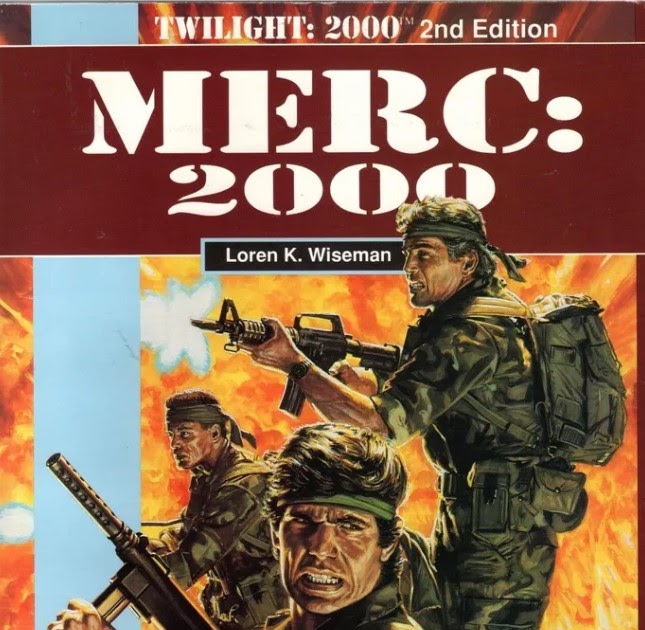SMOOSH JUICE
Retrospective: Merc: 2000

The last six months of 1989 marked the beginning of the end of Communism in Eastern Europe and, with it, the Cold War. Between June, when Solidarity won Poland’s first semi-free elections in decades and the execution of Nicolae Ceaușescu in late December – not to mention the fall of the Berlin Wall on November 9 – the world that had existed since 1945 unraveled in real time. These momentous events ushered in what U.S. president George H.W. Bush optimistically dubbed the “new world order.” For a time, many breathed a sigh of relief.
At Game Designers’ Workshop in Bloomington, Illinois, though, the end of the Cold War created a creative dilemma. Their military RPG Twilight: 2000 was built on a dark, alternate history premise: détente had failed, nuclear war had erupted, and civilization lay in ruins. Now that reality had taken a different path, that premise was suddenly obsolete. Line developer Loren Wiseman didn’t throw in the towel but instead adapted.
Merc: 2000, released in 1990, was his answer.
Rather than pivot away from military adventure, Merc: 2000 reimagined a world where the Cold War ends more or less peacefully, as it had in reality, but the peace is shallow. The Soviet Union lingers in a diminished state, the Third World seethes with brushfire wars, and the major powers, unwilling to commit their own troops, outsource dirty work to deniable assets. Enter the player characters as mercenaries for hire, plying their trade in a world where “peace” is just another illusion and every war is someone’s business opportunity.
In hindsight, Merc: 2000 reads as much as a nervous exhalation from a culture suddenly unsure of who the enemy is as a RPG supplement. To varying degrees, it captures the jittery uncertainty of the early ’90s, when ideology faded but the machinery of conflict kept humming. If Twilight: 2000 was a fever dream of what might have been, Merc: 2000 was a grim-eyed projection of what was coming.
And it wasn’t wrong.
The setting anticipates the rise of private military contractors, the shadow wars of the post-9/11 era, and the morally murky interventions of the ’90s, such as Somalia, the Balkans, the Persian Gulf, among too many others. It imagines a world of porous borders, covert missions, and soldiers who work for paychecks, not flags. Its tone of weary professionalism, competence without cause, sets it apart from the more operatic tone of Twilight: 2000. In some ways, I’d go so far as to say it’s aged better.
That said, Merc: 2000 isn’t a standalone game. It builds directly on Twilight: 2000‘s second edition, also released in 1990, and inherits both its strengths and its spiky complexity: crunchy mechanics, detailed equipment lists, and an emphasis on logistics, firearms, and realism. If you liked T2K’s obsessive attention to detail, you’ll find plenty to enjoy here. If not, Merc probably won’t change your mind.
What distinguishes it is scope. Where Twilight: 2000 offered survival in a wrecked Europe (and, later, America), Merc: 2000 gives you the world. Campaigns can explore corporate espionage, peacekeeping gone wrong, proxy wars, failed states, and morally ambiguous black ops. It opens the door to adventures that blend military action with politics, ideology, and personal cost, offering a sandbox of plausible deniability and ethical compromise.
From today’s perspective, what stands out most is how little Merc: 2000 glamorizes its subject. There are no grand causes, just contracts. No crusades, only jobs. In that, it feels oddly prophetic. It foresaw a world where war became a business and soldiers became freelancers in the global gig economy of violence.
Unlike Twilight: 2000, which I played quite a bit, I never had the chance to run Merc: 2000 back in the day. By the time it came out, I’d already drifted away from T2K, thinking the real world had outpaced it. Ironically, as my Barrett’s Raiders campaign heads back to the USA, I realize how much of Merc: 2000 has seeped into my imagination after all, particularly in the types of missions, the tone, the sense of purpose frayed by compromise that now animate that campaign.
Thirty-five years on, I think more highly of Merc: 2000 than I probably did upon its publication, not because, like Twilight: 2000, it depicted a world that never was, but rather because it depicted one we hadn’t yet admitted we were already living in.

